Here at Deli Enterprises Inc. we don’t cover nearly enough of the freak folk. And so to make amends we present the debut single out today by Anastasia Coope called “Norma Ray.”
Or not. Because there’s really no obvious label to apply to this music (plus who am I to gauge the level of freakiness?) which is an encouraging thing to say about any new artist. About the best way I can come up to describe the sound of “Norma Ray” is to say it’s like if Liz Phair went in a more experimental ambient post-rock direction early in her career (or later in her career). Or like if PJ Harvey made a psychedelic acoustic album produced by Brian Eno. Or like if Joanna Newsom hired Jane Birkin, Kate Bush, and Diamanda Galas as backing vocalists and gave them an echo box and told them to imitate a flock of seagulls. No, not the band, actual seagulls. Or like if…well, just listen to the song below and insert your own scenario because I don’t get paid by the musical simile sorry to say.
Anyway we have it straight from Anastasia herself that she “draws from influences such as Vashti Bunyan, Family Fodder, David Berman, Animal Collective, and early electronic composers in the vein of Daphne Oram” and that she’s also way into “Stereolab, the Everly Brothers, Steve Reich, Neu!, Pylon, Silver Jews, Spacemen 3, Faust, Broadcast, and many more” which means there is probably some more interesting music coming down the pike because that’s quite a list. (editors note: see the Purple Mountains/David Berman ((RIP)) cover version appended at the bottom of this entry)
Anastasia goes on to explain she “began writing music in a serious sense when quarantine began” and that she “continued this endeavor throughout my first year at Pratt Institute where I study painting.” Which points to some interesting parallels between some of Ms. Coope’s paintings with their oversized pointillistic portraiture (check out some of the paintings here) and the musical architecture of “Norma Ray” with its swarm of pinging echoes moving across the stereo spectrum like dots against an open-skied horizon created by faraway avian creatures in flight. And speaking of avian creatures in flight, I feel like this must be something like what bats hear when navigating by bio sonar aka “echolocation” and hey there’s a good name for this musical style or we could go with batcore instead. (did I say seagulls before well nevermind)
So, like, “Norma Ray” is a cool headphone listen for sure and it may even serve as good bio-sonar training for aspiring vampires. But the unorthodox vocal sounds are grounded by acoustic guitar backing and a small choir of overdubbed voices singing incantatory phrases in unison meaning this song could be used to ward off vampires and vampire bats too maybe. Quoting from Anastasia’s bandcamp page the combined effect is both “disruptive and whimsical” and that’s pretty dead-on, much like a tragicomic mime who experiences love and loss with a ragtag traveling circus or better yet a moonstruck Pierrot. And speaking of Pierrot Lunaire the seductive sonic disorientation of "Norma Ray" is mirrored in the song’s lyrics with its opening image of reflective surfaces (“maybe five screens will do what she wants them too”) a line that’s repeated and refracted through a new melodic contour followed by additional shards of impressionistic imagery and interior thoughts.
In conclusion, you can take your pick whether the song is more like a Kate Bush fever dream or a gaggle of vampire bats or a transitional Fellini movie or a ritual of mystical incantation or the musings of a moonstruck clown–or maybe if we’re judging by the title it’s an imagined dialogue between the nearly-titular labor activist and surrealist painter/photographer May Ray because why not. (editor’s note: remember, you don’t get paid per simile or metaphor) But whatever. The real takeaway is that Anastasia Coope paints a vivid, memorable picture in just under two minutes even if you can’t quite make out what the picture represents which is probably why I used/abused the word "like" eleven times in the text above. (Jason Lee)
